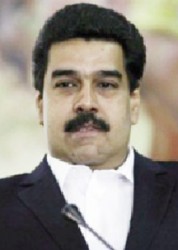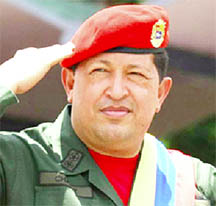CIUDAD CARIBIA, Venezuela, (Reuters) – Hovering over a sun-baked mountain one day in his presidential helicopter, Hugo Chavez had a dream: to build a utopian city that would showcase socialism in Venezuela.

Slowly and chaotically over the years that followed, the late president’s pet project – conceived a decade into his rule and named “Ciudad Caribia” for the country’s indigenous Carib people – began to take shape on the mountain 10 km (6 miles) northwest of the capital, Caracas.
“This was his dream. Now it is his legacy,” said hairdresser Yalmy Rumbo, 39, watching her children play and laugh in a public square where Cuban instructors were organizing games.
Rumbo is among the first 1,600 families, almost all refugees from floods and mudslides around Caracas, to have been given homes in new apartment blocks covered in Chavez imagery. Eventually, Caribia is intended to house 20,000 families, although critics complain at the slow pace of construction, the collapse of some shoddily-built walls and the lack of transparency over huge sums invested.
Caribia is a hotbed of pro-Socialist Party government sentiment in a country that otherwise was deeply divided in electing charismatic Chavez’s handpicked successor, Nicolas Maduro as president in April.
After Chavez’s death from cancer in March at the age of 58, the popularity of “El Comandante” has grown and taken on even deeper religious undertones among the support base that kept him in power for 14 years.
While that helped Maduro, a former bus driver, union activist and member of parliament win a six-year term as president, it is also making it near-impossible for him to step out of Chavez’s shadow.
“As long as Nicolas maintains Chavez’s route, the people will be with him. If he deviates from Chavez, everything will change, he’ll be finished,” said Rumbo.
Therein lies Maduro’s dilemma.

He owes everything, from his political inheritance to his election, to his late mentor. So, unsurprisingly, he parrots Chavez at every turn, be it thundering at the U.S. “empire” or trying to prove himself a man of the people during his daily, televised walkabouts.
Yet to solve a daunting array of problems, from the highest inflation in the Americas and embarrassing shortages of basic goods to rampant corruption and shoddy infrastructure, many feel Maduro needs to become his own man and tweak some policies.
“I feel sorry for him sometimes. He’s trying so hard to be like Chavez, but that’s simply an impossible task. I can understand why he’s doing it, but he can’t spend his entire six-year term like that,” a senior government insider told Reuters.
“It’s almost heresy to say it, but we know there were mistakes under Chavez, and it’s time to fix them. If we’re to survive, if ‘Chavismo’ is to survive, that is essential.”
The official, speaking on condition of anonymity, said there was an emerging view in the ruling Socialist Party that major policy planks such as nationalization and currency controls may have run their course.
CHAVEZ’S SHOES
As if following in the larger-than-life Chavez’s footsteps was not hard enough, Maduro, 50, only just made it into them in the first place, scraping through the April election by just 1.5 points when all polls had pointed to a bigger win.
There was much muttering within the Socialist Party over how Maduro could have squandered Chavez’s 11-point winning margin from the previous election in October 2012, despite the wave of sympathy over his death. Many blamed a lackluster campaign.
Losing opposition candidate Henrique Capriles refused to accept the result, accusing Maduro of fraud, and his coalition has since labeled the government illegitimate and incompetent.
Yet with the election board and courts throwing out Capriles’ challenge, and Latin American neighbors broadly backing him, Maduro appears to have shored up his political position.
In fact, his main threat is no longer the post-election dispute but the South American OPEC nation’s ailing and distorted economy.
Regardless of their politics, Venezuelans across the board are fed up with power cuts, rising prices – 45 percent in a year – and the increasing grind to make ends meet.
“I voted for Chavez, then for Maduro, but this is becoming intolerable,” said secretary Margarita Vivas, 43, leaving a supermarket in the middle-class Caracas district of El Paraiso after spending a third of her monthly salary on food.
Red banners of Chavez’s face and election posters for Maduro plastered walls next to the supermarket. “I have to say the truth, even if it hurts: socialism is making me poorer,” added Vivas, staring at the posters.
In a recent survey by pollster IVAD, 67 percent of Venezuelans had a pessimistic view of the country’s general direction, 20 points higher than at the election.
Maduro’s personal approval ratings, though, have only dipped a few points, to between 45-50 percent in most polls, perhaps as “Chavistas” stay loyal to the former president’s dying call for them to back Maduro, and give him longer to fix their problems.
Capriles’ ratings are off, too, as his election challenge sputtered and his media profile dropped.
“Maduro still has the benefit of the doubt. But if after a year, he is still trying to act like Chavez yet not showing progress, people may get tired and his ratings might fall into the 30s,” said David Smilde, a sociology professor at the University of Georgia who has studied Venezuela for 20 years.
“He needs to develop some independent policies.”
POLICY PRAGMATISM?
Maduro, who famously worked as a bus driver in Caracas before entering union activities and politics, says pessimism over his presidency is a product of a “war” against him by his opponents and media censorship of his achievements.
Terming his rule “Street Government”, Maduro reels off statistics – such as $16 billion disbursed in 2,000 new projects during his first 100 days in government – as evidence of fresh energy. “It’s a revolution within the revolution,” he said. Yet even supporters struggle to name any significant new policies.
Maduro has shown some hesitant signs of considering pragmatic reforms, particularly to unblock access to dollars.
He made a show of meeting with private businessmen – who were demonized by Chavez – and continually promises to tinker with a Byzantine currency control system to allow greater flexibility and a larger flow of hard currency.
Yet importers continue to moan at the lack of dollars. And the scramble for greenbacks is distorting the economy more than ever. The black market price for dollars is now about seven times the official rate of 6.3 bolivars, much weaker than under Chavez.
“The ‘pseudo’ economic policy pragmatism is a function of political pragmatism, ahead of the December local elections and the declining popularity of the Maduro administration,” Siobhan Morden, head of Latin America strategy at Jefferies, wrote in a research note in September. Such a withering assessment may be expected from Wall Street, but it is also starting to be heard in socialist circles.
Ruling party member and political analyst Nicmer Evans says the government is “kidding itself” that currency and price controls are working, and says selective corruption arrests will not work if better-connected officials are left untouchable.
“The currency controls, as now conceived, have become a den of corruption, and focus of action for the parasitical ‘boli-bourgeoisie’ who follow the same instinct as the old oligarchy – bleed the state dry,” Evans wrote in a blog last month, using an opposition term for those who made it rich under Chavez.
‘LIMPING ALONG’
The next flashpoint in Venezuelan politics is likely to come on Dec. 8 with elections for mayorships around the country.
Opposition activists are hoping grassroots discontent at the plethora of day-to-day problems will produce a protest vote, and Capriles is portraying the ballot as a referendum on Maduro.
Yet the government maintains a powerful vote-mobilizing machine and will present the election as a homage to Chavez, meaning another split-down-the-middle outcome is most likely.
A more significant date may be 2016, when the opposition has a chance to demand a referendum to try and recall Maduro. That measure is allowed under the constitution halfway through a presidential term, if some 3.8 million signatures are gathered.
Meanwhile, Venezuelan society remains as polarized, paranoid and rumor-rife as ever it was under Chavez. The government denounces assassination and coup plans almost every day, while opposition activists predict economic chaos will bring Maduro down. Despite some of the more excitable predictions, political analyst Smilde said he sees the government “limping along for a while.”
Back at Ciudad Caribia, all but a few residents are hoping Maduro will manage to complete his term in order to safeguard Chavez-era benefits which they say transformed their lives.
Community leader Margarita Fornica, 37, describes Chavez’s legacy in personal terms: from barely making a living in a damaged home on a hillside prone to mudslides, she now works as a cleaner at a school in Caribia, has five children enjoying free education, and is doing the TV production course she always dreamed of.
“He gave us a second chance at life,” she said, enthusiastically showing a visitor around the complex. “And he was such a visionary that he even prepared us for his death. He told us to follow Nicolas, so that is what I will do.”




